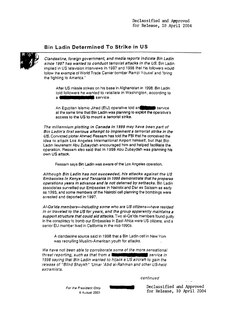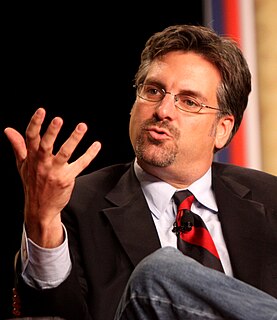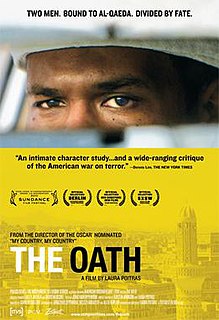
Donald Henry Rumsfeld was an American politician, government official and businessman who served as secretary of defense from 1975 to 1977 under president Gerald Ford, and again from 2001 to 2006 under President George W. Bush. He was both the youngest and the oldest secretary of defense. Additionally, Rumsfeld was a three-term U.S. Congressman from Illinois (1963–1969), director of the Office of Economic Opportunity (1969–1970), counselor to the president (1969–1973), the U.S. Representative to NATO (1973–1974), and the White House Chief of Staff (1974–1975). Between his terms as secretary of defense, he served as the CEO and chairman of several companies.

Osama bin Mohammed bin Awad bin Laden, also transliterated as Usama bin Ladin, was a founder of the Pan-Islamic militant organization al-Qaeda. The group is designated as a terrorist group by the United Nations Security Council, the North Atlantic Treaty Organization (NATO), the European Union, and various countries. Under bin Laden's leadership, al-Qaeda was responsible for the September 11 attacks in the United States, and many other mass-casualty attacks worldwide.

Paul Dundes Wolfowitz is an American political scientist and diplomat who served as the 10th President of the World Bank, U.S. Deputy Secretary of Defense, U.S. Ambassador to Indonesia, and former dean of Johns Hopkins SAIS. He is currently a visiting scholar at the American Enterprise Institute.

The Al-Shifa pharmaceutical factory in Khartoum North, Sudan, was constructed between 1992 and 1996 with components imported from Germany, India, Italy, Sweden, Switzerland, Thailand and the United States. It was opened on 12 July 1997 and bombed by the United States on 20 August 1998.

The National Commission on Terrorist Attacks Upon the United States, also known as the 9/11 Commission, was set up on November 27, 2002, "to prepare a full and complete account of the circumstances surrounding the September 11 attacks", including preparedness for and the immediate response to the attacks. The commission was also mandated to provide recommendations designed to guard against future attacks.

Richard Alan Clarke is an American national security expert, novelist, and former government official. He served as the Counterterrorism Czar as the National Coordinator for Security, Infrastructure Protection, and Counter-Terrorism for the United States between 1998 and 2003.

Bin Ladin Determined To Strike in US was the title of the President's Daily Brief prepared by the Central Intelligence Agency and given to U.S. President George W. Bush on Monday, August 6, 2001. The brief warned, 36 days before the September 11 attacks, of terrorism threats from Osama bin Laden and al-Qaeda, including "patterns of suspicious activity in this country consistent with preparations for a hijacking" of U.S. aircraft.
Michael F. Scheuer, is an American former intelligence officer for the Central Intelligence Agency, blogger, author, commentator and former adjunct professor at Georgetown University's Center for Peace and Security Studies. One assignment during his 22-year career was serving as Chief of the Bin Laden Issue Station from 1996 to 1999. He also served as Special Advisor to the Chief of Alec Station from September 2001 to November 2004.
Jamal Ahmed al-fadl is a Sudanese militant and former associate of Osama bin Laden in the early 1990s. Al-Fadl was recruited for the Afghan war through the Farouq mosque in Brooklyn. In 1988, he joined Al-Qaeda and took an oath of fealty to Bin Laden. After a dispute with Bin Laden, al-Fadl defected and became an informant to the United States government on al Qaeda activities.
Saddam Hussein and al-Qaeda link allegations were made by American government officials who claimed that a highly secretive relationship existed between Iraqi President Saddam Hussein and the radical Islamist militant organization Al-Qaeda between 1992 and 2003, specifically through a series of meetings reportedly involving the Iraqi Intelligence Service (IIS). In the lead up to the Iraq War, George W. Bush administration officials alleged that the Saddam Hussein regime had an operational relationship with al-Qaeda, basing the administration's rationale for war, in part, on this allegation and others.

Stephen Forester Hayes is an American journalist and author. In October 2019 Hayes co-founded the online opinion and news publication The Dispatch. Previously, he was a senior writer for National Journal and Editor-in-chief of The Weekly Standard. He was a staunch proponent of the Iraq War and an influential figure in promoting the false claim that the Saddam Hussein regime and Al Qaeda had an operational relationship.

Salim Ahmed Hamdan is a Yemeni man, captured during the invasion of Afghanistan, declared by the United States government to be an illegal enemy combatant and held as a detainee at Guantanamo Bay from 2002 to November 2008. He admits to being Osama bin Laden's personal driver and said he needed the money.

The rationale for the Iraq War, both the 2003 invasion of Iraq and the subsequent hostilities, was controversial because the George W. Bush administration began actively pressing for military intervention in Iraq in late 2001. The primary rationalization for the Iraq War was articulated by a joint resolution of the United States Congress known as the Iraq Resolution.
This article is a chronological listing of allegations of meetings between members of al-Qaeda and members of Saddam Hussein's government, as well as other information relevant to conspiracy theories involving Saddam Hussein and al-Qaeda.

Abu Musab al-Zarqawi, born Ahmad Fadeel al-Nazal al-Khalayleh, was a Jordanian jihadist who ran a terrorist training camp in Afghanistan. He became known after going to Iraq and being responsible for a series of bombings, beheadings, and attacks during the Iraq War, reportedly "turning an insurgency against US troops" in Iraq "into a Shia–Sunni civil war". He was sometimes known by his supporters as the "Sheikh of the slaughterers".

Peter Bergen's The Osama bin Laden I Know (ISBN 978-0-7432-7891-1) is a book published in 2006. It is a comprehensive collection of personal accounts by people who have met Osama bin Laden or worked with him at various stages of his terrorist career.

The September 11 attacks in the United States in 2001 were carried out by 19 hijackers of the militant Islamist terrorist organization al-Qaeda. In the 1990s, al-Qaeda leader Osama bin Laden declared a holy war against the United States, and issued two fatāwā that were released by bin Laden and others in 1996 and 1998. In these fatāwā, bin Laden sharply criticized the American government's financial involvement with the Saudi royal family as well as American military intervention in the Arab world.

The Oath is a 2010 documentary film directed by Laura Poitras. It tells the cross-cut tale of two men, Abu Jandal and Salim Ahmed Hamdan, whose meeting launched them on juxtaposed paths with al-Qaeda, Osama bin Laden, the September 11 attacks, US military tribunals and the U.S. Supreme Court. The film is the second of a trilogy, with the first being My Country, My Country (2006), documenting the lives of Iraqi citizens during the U.S. occupation of Iraq. The third, Citizenfour (2014), focuses on the NSA's domestic surveillance programs. The Oath is distributed both theatrically and non-theatrically in the US by New York-based Zeitgeist Films.
At around 9:30 pm on September 11, 2001, George Tenet, director of the Central Intelligence Agency (CIA) told President George W. Bush and U.S. senior officials that the CIA's Counterterrorism Center had determined that Osama Bin Laden and al-Qaeda were responsible for the September 11 attacks. Two weeks after 9/11, the Federal Bureau of Investigation connected the hijackers to al-Qaeda, a militant Salafist Islamist multi-national organization. In a number of video, audio, interview and printed statements, senior members of al-Qaeda have also asserted responsibility for organizing the September 11 attacks.

Mohammed Atef was the military chief of al-Qaeda, and was considered one of Osama bin Laden's two deputies, the other being Ayman Al Zawahiri, although Atef's role in the organization was not well known by intelligence agencies for years. He was killed in a US airstrike in November 2001.















